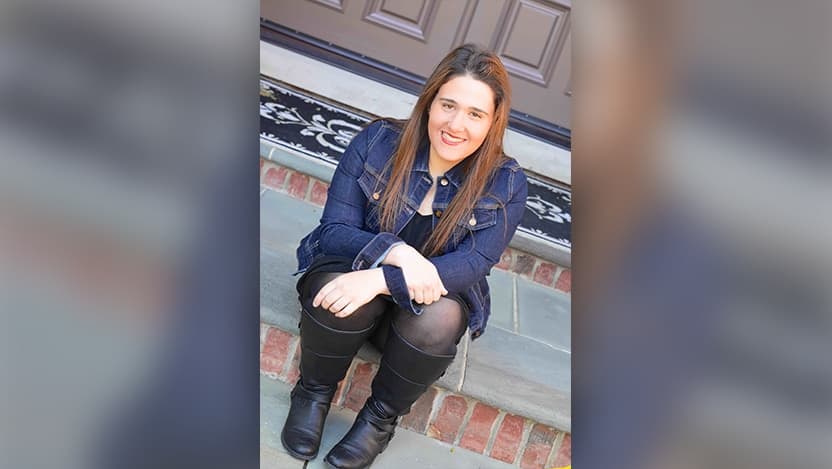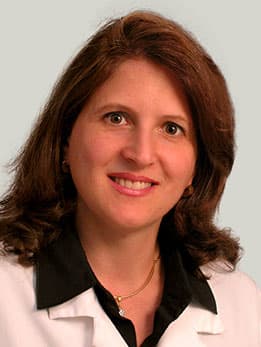Medically supervised weight loss program helps people reach a healthy weight

Medical student Amber Olson, 23, struggled with her weight. Doctors told her to eat less and exercise more for years.
“I’d gain five pounds and I knew, stepping on the scales in their offices, they would shake their heads in disappointment,” said Olson, who is finishing her first year at Case Western Reserve University School of Medicine. “Diets never worked for me.”
The Northbrook resident found an ally in Silvana Pannain, MD, Director of Chicago Weight, the University of Chicago Medicine’s comprehensive program to help adults manage their weight and any medical conditions associated with excess weight. The expert team at Chicago Weight provides patients with customized weight management plans that follow a comprehensive, interdisciplinary care model. The program’s specialized approach is centered on promoting weight loss and improving metabolic and cardiovascular health.
A medically supervised weight loss program, Chicago Weight factors in genetic predisposition, biology, emotional/social/behavioral stressors and existing medical issues in its integrated care model. Offered at the main campus in Hyde Park and River East location, the program treats patients age 17 and older.
Olson was 19 when she first came to the clinic in 2017. She was exhausted and had high blood pressure and prediabetes. Then a University of Chicago sophomore, she was 5-foot-5 and weighed 255 pounds.
Weight loss cannot be simply a question of willpower. Many are defeated by their own biology.
Today, Olson is 100 pounds lighter, in excellent health and enjoys yoga and CrossFit and cycling. She credits Chicago Weight’s ongoing, whole-person approach with helping her find a healthy lifestyle she can maintain.
"Pannain has a very thorough understanding that obesity is the result of so many integrating factors. It’s not just food. It’s not just exercise. It has to do a lot with physiology, psychology and habits,” Olson said.
Many chronic dieters are high achievers who successfully manage other aspects of their lives. They are sociable, have excellent relationships and satisfying careers. The myth that they lack self-discipline is a paradox not lost on Pannain.
Weight loss “cannot be simply a question of willpower,” Pannain said. “Many are defeated by their own biology.”
Researchers have discovered that genetics play a part in body size. Weight loss hormones drive hunger pangs and the body reacts to caloric reduction — perceived as starvation — by decreasing its metabolic rate. The body sabotages weight loss by storing fat, a main reason why dieters struggle with plateaus, which often results in despair and more overeating.
“Patients haven’t failed. Their physiology has failed them,” Pannain said.
Telling a patient to exercise willpower “is like asking a woman not to ovulate. When hormones change, it’s beyond your control,” Pannain said.
Once a patient completes a lengthy medical history, Pannain and her team work with the patient to tailor a personalized program that addresses their individual needs. Follow-up visits every four to eight weeks are dedicated to reviews, updates and counseling.
In Olson's case, the self-described perfectionist holds herself to high academic standards. She was an emotional and stress eater while studying, turning to Oreos, ice cream and peanut butter cups for comfort. Pannain prescribed Olson with an appetite suppressant and the pounds began to roll off, which encouraged her to stick with the program. Her cravings evaporated with her fatigue. Her blood pressure and blood sugar also stabilized.
Empowered, she began exercising and soon was able to sprint to classes across the Hyde Park campus. She shed 75 pounds within a year and sustained the weight loss.
Nutritionist Taylor Durkin, RD, counseled her to substitute brown rice for white and discussed the nutritional value of lean meats and veggies. When temptation reared – dorms are awash with pizza — Olson strategized with clinical psychologist Andrea Busby, PhD, a specialist in health psychology. The two came up with a plan for Olson to bring healthy snacks to get-togethers so she wouldn’t feel left out.
They also agreed that a shelf in the family refrigerator could be reserved for her yogurt and fruit when she was home. Her parents were happy to accommodate the change.
When Olson’s progress stalled in 2019, she followed Pannain’s suggestion to switch temporarily from regular meals to Optifast substitutes. The change jump-started her metabolism and she dropped another 25 pounds. Now she cooks for herself with heart-healthy recipes to maintain her weight loss.
A bright future beckons. Olson plans to graduate with an MD/MPH in 2025, incorporate obesity care and research into her career, and rally overweight patients to wellness. She has been working on improving obesity education in the medical school, and received a research fellowship for an obesity education improvement project this summer. She also founded an Obesity Medicine Interest Group for medical students, which will start in the 2021-2022 academic year.
“Before I met Dr. Pannain, I experienced a lot of distance between me and my physicians because of my size,” she said. “As a physician, I would like to bridge that gap for my patients and encourage other physicians to do the same.”
Chicago Weight: A Weight Management Program for Adults
UChicago Medicine's Weight Management Program is designed to help patients manage excess weight, as well as any associated medical conditions. Our team works with each patient to create an individualized care plan. We offer a full spectrum of services and, depending on your needs, may recommend nutritional and physical activity counseling, psychological and lifestyle counseling, medications, endoscopic bariatric procedures and/or surgery.
Learn more about our weight loss program
Silvana Pannain, MD
Dr. Silvana Pannain is a skilled endocrinologist. She provides advanced endocrinology care for patients who have weight problems or endocrine disorders. Dr. Pannain also serves as director of Chicago Weight, a weight loss program and support group at the University of Chicago Medicine.
Read Dr. Pannain's physician profile